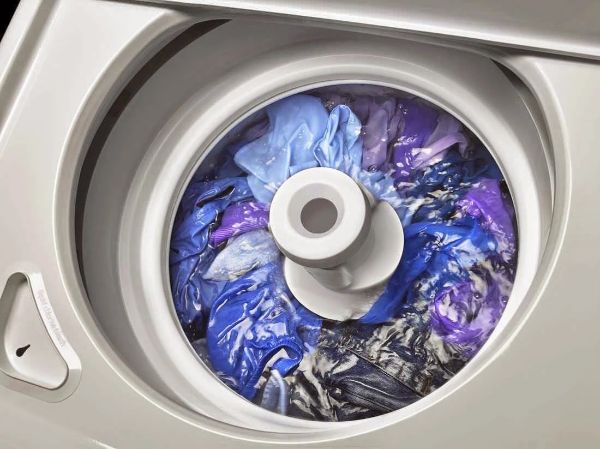When it comes to choosing a washing machine, one of the key decisions you’ll need to make is whether to opt for an agitator or an impeller washer. These two types of washers have different mechanisms for cleaning your clothes, and understanding their pros and cons is crucial in making an informed choice.
In this blog post, we will explore the characteristics, advantages, and disadvantages of both agitator and impeller washers to help you determine which option is best suited to your laundry needs.
Table of Contents
Agitator Washer
An agitator washer features a central column with fins or vanes that move in a twisting motion to agitate the clothes during the wash cycle. Here are the pros and cons of agitator washers:
Pros
- Deep Cleaning: Agitator washers are known for their vigorous agitation, which helps to remove stubborn stains and dirt from clothes effectively. The twisting action ensures thorough coverage and deep cleaning, making them ideal for heavily soiled garments.
- Versatility: Agitator washers can accommodate a wide range of fabrics and laundry types. From delicate items to bulky bedding, the agitator’s movement can adapt to different load sizes and provide effective cleaning across various garment types.
- Faster Wash Times: Agitator washers typically have shorter wash cycles compared to impeller washers. This can be advantageous for those who prefer quicker laundry cycles or have limited time for doing laundry.
Cons
- Agitation on Delicate Fabrics: While agitators excel at deep cleaning, they may not be as gentle on delicate fabrics. The vigorous movement can cause increased wear and tear or tangling of delicate items like lace, silk, or knitted garments.
- Water Consumption: Agitator washers tend to use more water per cycle compared to impeller washers. If water conservation is a concern, this may be a drawback to consider.
Impeller Washer
Impeller washers, also known as high-efficiency (HE) washers, utilize a low-profile cone or disc located at the bottom of the drum. The impeller creates a turbulence effect to move clothes gently through the water. Here are the pros and cons of impeller washers:
Pros
- Gentle on Fabrics: Impeller washers provide a gentler washing action, making them suitable for delicate fabrics. The absence of a central agitator reduces the risk of clothes getting tangled or stretched during the wash cycle.
- Energy and Water Efficiency: Impeller washers are designed to be more energy-efficient and use less water compared to agitator washers. They require less water to fill the drum, reducing overall water consumption and potentially lowering your utility bills.
- Increased Capacity: Impeller washers often have larger drum capacities, allowing for larger loads and more efficient laundry cycles. This can be advantageous for households with a higher volume of laundry or larger items like bedding.
Cons
- Less Aggressive Cleaning: While impeller washers are effective at cleaning most clothes, they may not offer the same level of deep cleaning as agitator washers. Certain stains or heavily soiled garments may require pre-treatment or additional cycles.
- Longer Wash Times: Impeller washers generally have longer wash cycles compared to agitator washers. The gentler washing action may take more time to achieve the desired cleaning results, which can be a consideration if you prefer quicker cycles.
Agitator vs. Impeller Washer: Pros and Cons
| Agitator Washer | Impeller Washer | |
|---|---|---|
| Pros |
|
|
| Cons |
|
|
Conclusion
The choice between an agitator and impeller washer ultimately depends on your specific laundry needs and priorities. Agitator washers excel at deep cleaning and versatility but may be less gentle on delicate fabrics. Impeller washers offer energy and water efficiency, as well as
increased capacity, but they may require longer wash times and may not provide the same level of aggressive cleaning as agitator washers.
It’s important to assess your laundry preferences, the types of garments you frequently wash, and your efficiency and conservation priorities before making a decision. If you often deal with heavily soiled items or prefer a quicker wash cycle, an agitator washer might be the better choice. On the other hand, if you prioritize gentle care for delicate fabrics, energy and water efficiency, and have larger laundry loads, an impeller washer may be more suitable.
Regardless of your choice, there are a few general tips to maximize the performance of your washing machine:
- Read the User Manual: Familiarize yourself with the manufacturer’s instructions and recommendations for your specific washer model. This will help you understand the machine’s features, settings, and maintenance requirements.
- Sort Laundry Carefully: Separate your laundry based on fabric type, color, and soil level. This ensures that delicate items are treated gently, colors don’t bleed, and heavily soiled clothes receive proper cleaning.
- Use Suitable Detergents: Select detergents that are compatible with your washer type. Some detergents are specifically formulated for high-efficiency (HE) washers, while others are designed for agitator washers. Follow the recommended dosage to avoid excessive suds or detergent residue.
- Follow Proper Maintenance: Clean the washer regularly by running a maintenance cycle or wiping down the drum and detergent dispenser. This helps prevent build-up of dirt, lint, or detergent residues that could affect performance.
- Experiment with Settings: Test different wash cycles, water temperature options, and additional features to find the optimal settings for your laundry. This can help you achieve the desired cleaning results while conserving energy and water.
Remember, both agitator and impeller washers have their own advantages and disadvantages. Consider your laundry needs, the types of clothes you frequently wash, and your efficiency priorities to make an informed decision. By selecting the right washer for your specific requirements and following proper laundry practices, you can maintain the quality and cleanliness of your garments while optimizing your washing machine’s performance.

